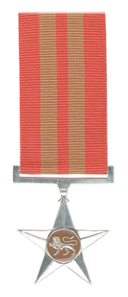
The Day of Reconciliation is a public holiday in South Africa held annually on 16 December. The holiday came into effect in 1994 after the end of apartheid, with the intention of fostering reconciliation and national unity for the country. The date was chosen because it was significant to both Afrikaner and African cultures. The government chose a meaningful date for both ethnic groups because they recognize the need for racial harmony. The celebration of the Day of Reconciliation can take the form of remembering past history, recognizing veteran's contributions, marching and other festivities.
Events from the year 1962 in South Africa. This year is notable for its internal and international resistance campaigns against the country's Apartheid legislation. Umkhonto we Sizwe, the militant wing of the African National Congress, made its first sabotage attacks in 1961, and Nelson Mandela traveled to Ethiopia to rally support for Umkhonto and justify the attacks. Nelson Mandela was sentenced to jail for 5 years upon returning to South Africa for illegally leaving the country. The international sporting community also showed its displeasure with the government's laws. FIFA suspended South Africa in 1962 for fielding an exclusively-white South African national football team, forcing South African football authorities to add black players to the team. The government, in turn strengthened methods of enforcing Apartheid, and the Robben Island prison was made a political prison in 1962.
The following lists events that happened during 1981 in South Africa.
Umkhonto we Sizwe is a reggae album by Prince Far I, released in 1984 and which he was recording when he was murdered in 1983. The album is named in honor of the fight of the militant wing of the ANC.

The Star for Bravery in Gold, post-nominal letters SBG, was instituted by the President of the Republic of South Africa in April 1996. It was awarded to veteran cadres of Umkhonto we Sizwe, the military wing of the African National Congress, who have distinguished themselves during the "struggle" by performing acts of exceptional bravery in great danger.

The Star for Bravery in Silver, post-nominal letters SBS, was instituted by the President of the Republic of South Africa in April 1996. It was awarded to veteran cadres of Umkhonto we Sizwe, the military wing of the African National Congress, who had distinguished themselves during the "struggle" by performing acts of bravery.

The Conspicuous Leadership Star, post-nominal letters CLS, was instituted by the President of the Republic of South Africa in April 1996. It was awarded to veteran cadres of Umkhonto we Sizwe, the military wing of the African National Congress, who have distinguished themselves during the "struggle" by distinguished conduct and exceptional combat leadership.

The Decoration for Merit in Gold, post-nominal letters DMG, was instituted by the President of the Republic of South Africa in April 1996. It was awarded to veteran cadres of Umkhonto we Sizwe, the military wing of the African National Congress, who had distinguished themselves during the "struggle" by outstanding service and utmost devotion to duty.

The Merit Medal in Silver, post-nominal letters MMS, was instituted by the President of the Republic of South Africa in April 1996. It was awarded to veteran cadres of Umkhonto we Sizwe, the military wing of the African National Congress, who had distinguished themselves during the "struggle" by exceptionally meritorious service and particular devotion to duty.

The Merit Medal in Bronze, post-nominal letters MMB, was instituted by the President of the Republic of South Africa in April 1996. It was awarded to veteran cadres of Umkhonto we Sizwe, the military wing of the African National Congress, who had distinguished themselves during the "struggle" by service of a high order.

The Operational Medal for Southern Africa was instituted by the President of the Republic of South Africa in 1998. It was awarded to veteran cadres of Umkhonto we Sizwe and the Azanian People's Liberation Army for operational service outside South Africa during the "struggle".

The South Africa Service Medal was instituted by the President of the Republic of South Africa in 1998. It was awarded to veteran cadres of Umkhonto we Sizwe and the Azanian People's Liberation Army for operational service inside South Africa during the "struggle".

The Service Medal in Gold was instituted by the President of the Republic of South Africa in April 1996. It was awarded to veteran cadres of Umkhonto we Sizwe, the military wing of the African National Congress, for thirty years exemplary service.

The Service Medal in Silver was instituted by the President of the Republic of South Africa in April 1996. It was awarded to veteran cadres of Umkhonto we Sizwe, the military wing of the African National Congress, for twenty years service.

The Service Medal in Bronze was instituted by the President of the Republic of South Africa in April 1996. It was awarded to veteran cadres of Umkhonto we Sizwe, the military wing of the African National Congress, for ten years service.

The Gold Decoration for Merit, post-nominal letters GDM, was instituted by the President of the Republic of South Africa in April 1996. It was awarded to veteran cadres of the Azanian People's Liberation Army, the military wing of the Pan Africanist Congress, for outstanding service and utmost devotion to duty during the "struggle".

The Silver Medal for Merit, post-nominal letters SMM, was instituted by the President of the Republic of South Africa in April 1996. It was awarded to veteran cadres of the Azanian People's Liberation Army, the military wing of the Pan Africanist Congress, for exceptionally meritorious service and particular devotion to duty during the "struggle".

Operation Nickel or the Wankie Campaign or the Wankie Battles was a military operation launched by the Rhodesian Security Forces on 1 August 1967 in response to the a group of ZIPRA and Umkhonto we Sizwe (MK) fighters crossing the Zambezi river, which marked the Rhodesian-Zambian border. The operation was a success with only one of the cadres out of a force of seventy-nine making it back to Zambia.

















